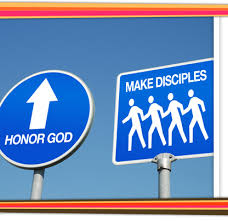When I was a teenager, I didn’t like yardwork. I lived in South Carolina where the summers were always hot and my parents had a very large yard. It wasn’t that the yardwork all that bad. My dad had a riding mower so it didn’t take long to mow the grass, but I still didn’t like it. It was a never-ending pattern. I would mow the grass and then, like clockwork, 5-days later it was time to mow again.
One of the things that led to my teenage frustration, however, was this. I lacked perspective. I wanted immediate satisfaction, and I “couldn’t get no satisfaction” from yardwork (my apologies to Mick Jagger and The Rolling Stones). I found my satisfaction in doing other things. There were other things in my life that provided me with immediate, positive feedback. Yardwork, at the time, wasn’t one of them.
Now, decades later, I’m faced with a similar frustration. As a Christian, I know that I’m called to make disciples, and making disciples can be tremendously rewarding. But it’s a slow process that doesn’t always provide immediate gratification. Now, decades later, I find that yardwork provides me with the immediate gratification for which I long. Let me explain.
When I go out into my yard with my lawnmower, weed-eater, and hedge-trimmers, if I work hard for two- or three-hours, when I finish, my yard will provide me with immediate, positive feedback. Earlier in the day the lawn was long and unkempt. Now, the lawn has a uniformed height. Earlier, I couldn’t tell where the lawn ended and my sidewalk began. Now, my lawn and my sidewalks have a nice, crisp edge. Earlier, my hedges were overgrown, now, they’re neatly trimmed. In just a few hours, my lawn has undergone a complete transformation.
But making disciples isn’t like caring for your lawn. You control many of the variables in caring for your lawn. You know when to water, when to apply the fertilizer, when to mow, etc. There’s a formula for mowing the grass. If you follow that formula, depending on the size of your yard, in just a few hours you will have a beautifully manicured yard.
Well, there’s a “formula” for disciple making as well, but in this formula, you don’t control the most important variables. The formula for disciple making involves people, the Word of God, and the Holy Spirit. Of those three variables, the only one that we control is the Word of God, and we only “control” it in the sense that we can read it and study it and apply it to our lives.
The formula for disciple making doesn’t prescribe an “amount” of the Word of God to apply into someone’s life before Christlike transformation begins to take place. The formula for disciple making is dependent both on the person and on the work of the Holy Spirit.
But allow me to state the obvious. Making disciples is infinitely more important that lawn care! Jesus commanded his followers to make disciples (Matthew 28:18–20). In his final letter, Paul urged young Timothy to be patient in the work of disciple making. He said, “preach the word; be ready in season and out of season; reprove, rebuke, and exhort, with complete patience and teaching” (2 Timothy 4:2; emphasis added).
So, if you need some immediate gratification, if you need some immediate satisfaction, grab your mower, your weed-eater, and your hedge-clippers, and get out in your yard and work hard for a few hours. But if you’re interested in eternal work, if you’re interested in eternal rewards, grab your Bible and grab a friend and give yourself to the work of making disciples.








